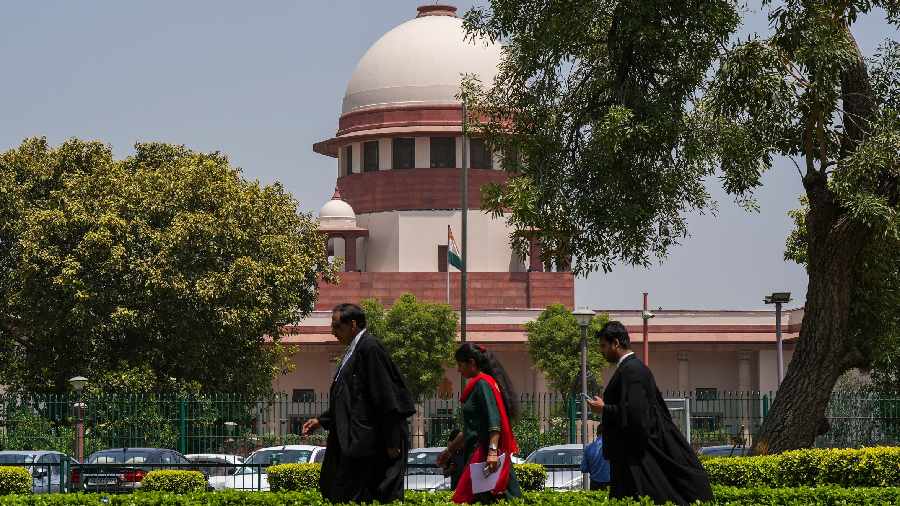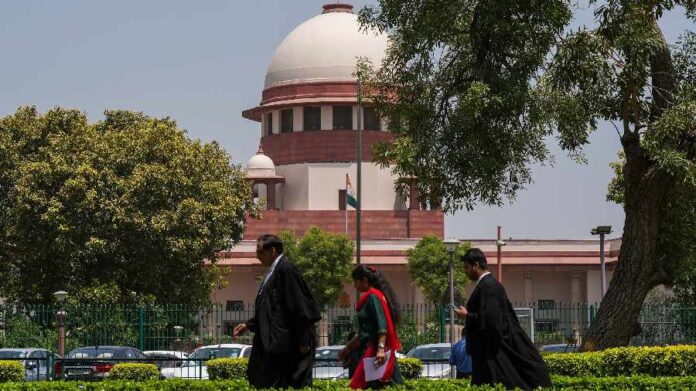“Supreme Court Orders Release of Reformed Convict After 26 Years in Prison, Emphasizing Fundamental Rights: A Landmark Ruling on Premature Release and Rehabilitation”
In a groundbreaking decision today, the Supreme Court has ruled in favor of the release of a convict who endured nearly 26 years behind bars, underscoring that the denial of premature release infringes upon fundamental rights safeguarded under Article 14 (Right to Equality) and Article 21 (Right to Life) of the Constitution. The Court stressed the importance of assessing the rehabilitation and transformation of prisoners who may have undergone significant changes during their lengthy incarceration.

The bench, consisting of Justices S. Ravindra Bhat and Dipankar Datta, expressed its concern over the denial of premature release to inmates who have served exceptionally long sentences. The bench remarked, “Excluding the relief of premature release to prisoners who’ve served extremely long periods of incarceration not only crushes their spirit and instills despair but signifies society’s resolve to be harsh and unforgiving. The idea of rewarding the prisoner for good conduct is entirely negated.”
This case emerged from a writ petition filed under Article 32 of the Constitution by Joseph, a prisoner currently aged 65, who had been held in a Kerala prison since 1998 for his involvement in the murder and robbery of a woman.
Justice Bhat, delivering the judgment, framed the case as a plea for compassion and a reevaluation of the treatment of long-serving inmates. The Court questioned the rationality of persistently punishing individuals who have recognized their wrongdoing, no longer identify with their past actions, and have undergone substantial personal transformations over the years.
The Court also highlighted that the insistence on such extended sentences could lead to a situation where convicts spend their entire lives in prison, never experiencing freedom, for crimes committed years ago.
Joseph’s legal journey began with charges of rape and murder in 1994, leading to his acquittal by a trial court in 1996. However, the High Court reversed this acquittal in 1998, convicting him of murder and robbery under Sections 302 and 392 of the Indian Penal Code, respectively, and sentencing him to life imprisonment. The Supreme Court upheld this conviction and sentence in 2000.
Despite recommendations from the advisory board, Joseph’s requests for premature release were repeatedly denied by the government, notably in 2017 and 2020. In 2022, a government order further restricted premature release, specifically excluding those convicted of murder involving women and children or murder combined with rape.
Joseph’s counsel argued that his case should be considered based on the remission policy in place at the time of his 1998 conviction, emphasizing that continued incarceration without the benefit of premature release violated statutory rules and Articles 14 and 21. The petitioner also cited discrimination, asserting that individuals who committed similar offenses were granted release between 2000 and 2016.
The Court’s judgment underscored the importance of considering factors like good behavior and rehabilitation when evaluating prisoners’ release, stating, “The insistence of guidelines obdurately not to look beyond the red lines drawn by it and the continued denial to consider the impact of prison good behavior and other relevant factors to ensure that such an individual has been rid of the likelihood of causing harm results in the violation of Art. 14.”
The Court referred to the 1958 rules, which deemed life imprisonment to be equivalent to 20 years of incarceration, after which prisoners were eligible for premature release. Additionally, the Court cited National Human Rights Commission (NHRC) guidelines, recommending release after serving 25 years, even for heinous crimes.
Recognizing the cruelty of asking the petitioner to approach the remission advisory board again given his extended period of incarceration, the Court declared his immediate release. The Court expressed that failing to do so would contradict the principles of the rule of law and fairness.
In light of this historic ruling, the Court allowed the petition and addressed the pending applications.
Case Details:
- Title: Joseph v. State of Kerala
- Citation: W.P.(Crl.) No. 520/2022
- Legal Representation: Advocate Adolf Mathew, Advocate-on-Record Sanjay Jain



